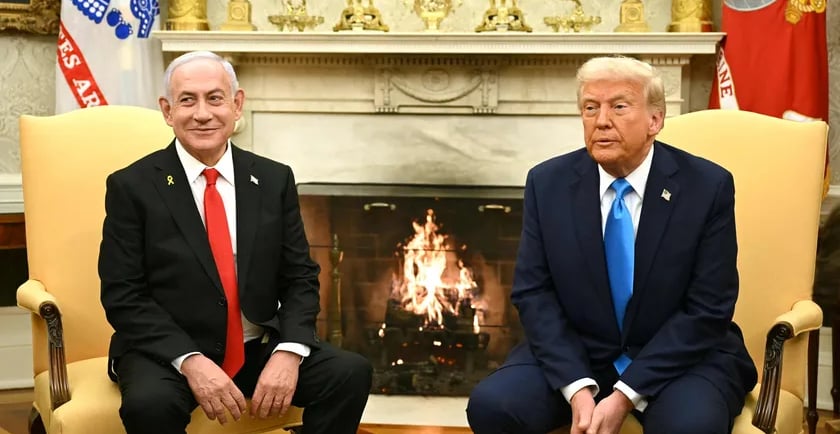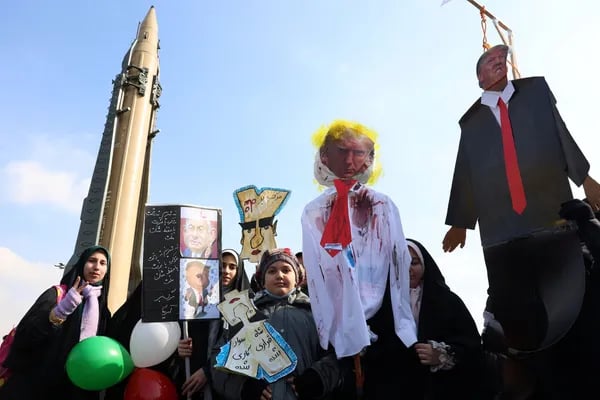Netanyahu Plans to Attack Iran and Is Plotting to Lure Trump Into the War
By attacking Iran, with or without the United States, Israel's prime minister seeks to turn the October 7 calamity into an epic strategic triumph. Will the Saudis help Trump avert this?
Ha'aretz - Alon Pinkas - Feb. 14, 2025
2/15/20256 min read


The Iran nuclear issue, in the context of U.S.-Israeli relations, can develop in four starkly different directions in the next few months.
In the first scenario, Washington and Jerusalem clash when Donald Trump concludes that Benjamin Netanyahu is manipulating him into entering an unnecessary war on Iran, despite the U.S. president's intentions to negotiate with Tehran and seal a nuclear deal.
In the second scenario, the United States and Israel collaborate in attacking Iran's nuclear sites, following a Trump ultimatum that Iran must totally disband its military nuclear program "Libya-style."
Iranians carrying effigies of Trump in Tehran on Monday.


In the third scenario, Israel attacks Iran's nuclear facilities without direct American cooperation but with its implicit consent, following Tehran's refusal to cave to Trump's coercive diplomacy and threats.
For Iran, the dilemma is excruciating. Refusal to assent to Trump's maximalist demands in order to avert a national humiliation and keep the ayatollahs' regime stable could trigger a war that would dent both the regime's pride and its stability. The Iranians can preempt this with a supervised disarmament initiative that Trump finds attractive enough, but this is unlikely to happen.
Then there's the fourth scenario: Saudi Arabia, the key regional actor with sway over Trump, convinces the president to make Iran a "golden bridge" offer, à la the great Chinese military strategist from ancient times, Sun Tzu. This would ensure nuclear disarmament but provide Iran with economic incentives and keep its pride intact.
Iranian Supreme Leader Ali Khamenei at an exhibition Wednesday on Iran's latest achievements in the defense industry.
Saudi Arabia is a U.S. ally that can offer Trump many things that Israel cannot, not least $600 billion in investments in the United States.
So it's logical to assume that while the Saudis perceive Iran as a long-term potential threat, a regional disrupter and a pyromaniac, they will warn Trump of the destabilizing repercussions of an attack and cater to his self-aggrandizing deal-making proclivities.
This scenario is viable but could also serve as the preamble to the first scenario: a U.S.-Israeli clash.
Somewhat ironically, all four scenarios stem from the same core assessment: Iran is now weak, vulnerable and isolated, lacking both deterrent power and significant retaliatory capabilities.
In the past year, Iran lost its prized proxy asset, Hezbollah, and with this the deterrence that weighed heavily on Israel's military planners.
With the fall of the Assad regime, Iran lost Syria as an arms conduit, and with it, Russia's military presence.
And in October, Iran suffered setbacks to its air defenses and missile-production capabilities after its missile-and-drone exchanges with Israel.
Trump speaking with Saudi Crown Prince Mohammed bin Salman in Osaka, Japan, in 2019.
None of this means that Trump is trigger-happy and pining to bomb Iran. As he told Fox News this week, "I would prefer that not happen. … I'd much rather see a deal with Iran. … There's two ways of stopping them: with bombs or with a written piece of paper."
He was referring to his attempts late in his first term, in 2019 and 2020, to renew the nuclear deal after he unilaterally withdrew from it in 2018.
This is further reinforced by his recent overtures to Vladimir Putin, an Iranian ally over the last three years, as both countries suffered severe sanctions.
Trump's exultant account of his "great" phone conversation with Putin implies that he may have acquiesced to Russia's maximalist demands on ending the war in Ukraine.
His desertion of Ukraine is no longer a question, it's a matter of time and style.
But in his next conversations with Putin, Iran is bound to come up, and Russia, a signatory to the 2015 nuclear deal, will surely caution him about attacking.
When Netanyahu went to the White House 10 days ago, the assumption was that the conversation would focus on the second stage of the Gaza cease-fire and hostage deal.
After the meeting, the whole Middle East went apoplectic over Trump's ingenious idea to empty Gaza of its 2.3 million Palestinians, relocating (later amended to expelling) them to Egypt, Jordan, Somalia and Indonesia.
Then he would build a Gaza Riviera.
Trump and Vladimir Putin meeting in Helsinki in 2018.
But Iran came up and we can assume that this was the first of a series of discussions Netanyahu plans on having with Trump over his pet project and obsession.
"Israeli Prime Minister Benjamin Netanyahu has discussed with Trump several possible levels of American backing, ranging from active military support for a kinetic strike – such as intelligence, refueling or other assistance – to more limited political backing for a coercive ultimatum," David Ignatius wrote in The Washington Post on Thursday.
He noted the paper's report the previous day: U.S. military intelligence assessed in January that, absent an agreement, Israel would probably strike Iran's nuclear facilities, most likely the Fordow enrichment plant, in the first half of 2025.
Israel lacks "bunker buster" bombs and the capacity to mount a sustained air attack that would destroy Iran's entire nuclear program.
That would take the GBU-57A/B MOP, the Massive Ordnance Penetrator, a 30,000-pound (14,000-kilogram) monster that needs a B-2 bomber.
Israel has smaller bunker busters, so whatever damage it could do would set back Iran anywhere between six and 18 months, according to rough estimates.
That's not insignificant, but it carries risks.
A sense of urgency prevails: Israeli intelligence estimates that Iran now has uranium-enrichment capabilities reaching the 90 percent military-grade level and can theoretically make several bombs in several months if it goes that route.
Despite the threat and challenges that Iran poses, the real urgency isn't uranium enrichment, it's all about Netanyahu's political considerations.
By attacking Iran, with or without the United States, he seeks to turn the October 7, 2023, calamity into what he believes would be an epic strategic triumph.
Iran, not Gaza or the Palestinians, has always been Netanyahu's claim to fame and how he defines his self-ordained role as the savior of Israel and Western civilization.
That's why, while the hostage deal and the Gaza cease-fire are rightly getting all the attention, we should pay close attention to his Iran policy.



The issue of whether or not Iran has nuclear capability or not is fairly irrelevant, in light of the fact that Iran can destroy Tel Aviv and Haifa within ten minutes using Iran's 150,000 ballastic missiles and an unknown number of evasive hypersonic missiles.
The dirty secret that Israel and the U.S. don't want people to know is that Israel's Iron Dome and the U.S. Terminal High Altitude Area Defense (THAAD) CANNOT shoot down Iran's evasive hypersonic missiles, as evidenced in recent months.
In fact an Iranian hypersonic missile destroyed a U.S. Thaler system defending Israel.
The Israeli government is well aware that Iran can easily overwhelm Israel's IRON DOME, David's Sling and Arrow 3 defensive systems by the sheer volume of incoming ballastic missiles, destroying Israeli's anti-missile defensive systems, leaving Israel completely vulnerable to additional waves of missiles.
Iran could fire 5,000 missiles every 60 minutes for hours and hours until very little is left standing. Netanyahu knows this.
In other words, Iran knows they do not need nuclear weapons to destroy Israel.
Iran could have developed nuclear weapons long ago, but didn't because their faith prohibits them from committing mass murder - that's why Iran has been to war only once in the past 350 years.
HOWEVER, in recent years due to the growing U.S. and Israeli threat to Iranian existence, Iran began developing a nuclear bomb.
There was internal debate as to whether or not Iran would use a nuclear bomb on Israel, and even though the Koran forbids mass murder the Koran also provides for self-defense.
It's worth mentioning that the Iranian preferred method of stopping Israeli aggression, threats and occupation is via ground invasion instead of wholesale bombing and detonating nuclear bombs.
Iranian military leaders say Iran has 2 million soldiers itching to write the final chapter of Israel.
Certainly Netanyahu and Israeli officials are completely aware of Iran's military status and capabilities and have no real desire to straight up go to war with Iran by themselves - BUTTTTTTTTTTT, Netanyahu is busy as a rat digging his way into the mind of the U.S. President, trying to coax him into launching a major military attack on Iran.
Political news, commentary for the enraged reader
contact@dailybeastie.com
© 2025 DailyBeastie.Com - All rights reserved.

